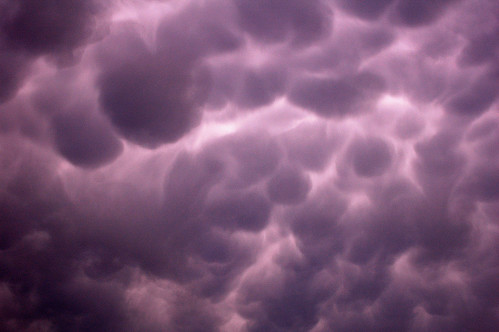This is a great example of mammatus clouds. They usually form on the 'ceiling' of anvil thunderheads, just where the air is heavy with moisture. Like full breasts, they seem to long to release some of this moisture as precipitation.
From Wikipedia: Mammatus (also known as mamma or mammatocumulus, meaning "breast-cloud") is a meteorological term applied to a cellular pattern of pouches hanging underneath the base of a cloud. The name "mammatus" is derived from the Latin mamma, or breast, due to some persons believing that the clouds bear a significant resemblance to human female breasts.
Mammatus are most often associated with the anvil cloud that extends from a cumulonimbus, but may also be found under altocumulus, altostratus, stratocumulus, and cirrus clouds, as well as contrails and volcanic ash clouds. In the United States, sky gazers may be most familiar with the very distinct and more common cumulonimbus mammatus. When occurring in cumulonimbus, mammatus are often indicative of a particularly strong storm. These tend to form more often during warm months and over the midwest and eastern portions of the country, and more infrequently over the west and southwest. Due to the intensely sheared environment in which mammatus form, aviators are strongly cautioned to avoid cumulonimbus with mammatus.
Mammatus may appear as smooth, ragged or lumpy lobes and may be opaque or semitransparent. Because mammatus occur as a grouping of lobes, the way they clump together can vary from an isolated cluster to a field of mamma that spread over hundreds of kilometers to being organized along a line, and may be composed of unequal- or similarly-sized lobes. The individual mammatus lobe average diameters of 1-3 km and lengths on average of 0.5 km. A lobe can last an average of 10 minutes, but a whole cluster of mamma can range from 15 minutes to a few hours. Their composition is usually mostly ice, but can be a mixture of ice and liquid water or almost entirely liquid water.

No comments:
Post a Comment